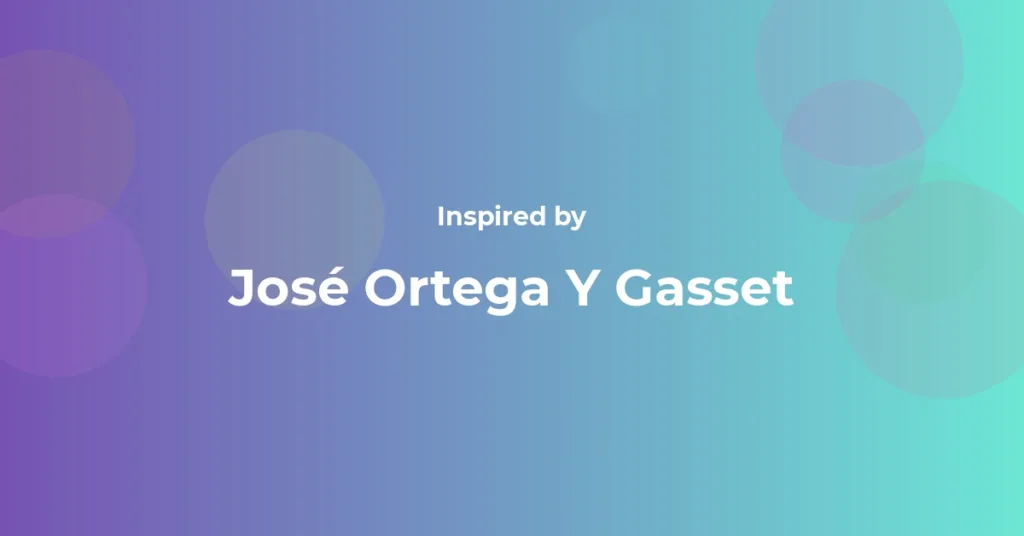
José Ortega Y Gasset Famous Quotes and Affirmations
José Ortega Y Gasset (1883-1955) stands as one of the most influential Spanish philosophers of the 20th century, whose ideas on existentialism, culture, and society continue to resonate. Born in Madrid, Ortega was a thinker who bridged the gap between philosophy and public discourse, engaging with issues of modernity, individualism, and the role of the masses. His works, characterized by clarity and depth, reflect a profound concern for the human condition in an era of rapid change. As a professor, writer, and founder of the influential Revista de Occidente, he shaped intellectual thought in Spain and beyond. This article explores Ortega’s enduring legacy through his most famous quotes, aphorisms, and inspired affirmations. It delves into his key ideas, major works, and lesser-known aspects of his life, offering a comprehensive look at a philosopher whose insights remain relevant in understanding the complexities of contemporary society.
José Ortega Y Gasset Best Quotes
Below are some of the most notable and verified quotes from José Ortega Y Gasset, sourced directly from his original works with precise citations. These reflect his philosophical depth and engagement with themes of life, culture, and individuality.
- “I am I and my circumstance; and, if I do not save it, I do not save myself.” – José Ortega Y Gasset, Meditations on Quixote (1914), p. 45
- “Life is a series of collisions with the future; it is not the sum of what we have been, but what we yearn to be.” – José Ortega Y Gasset, Meditations on Quixote (1914), p. 47
- “The mass is all that which sets no value on itself—good or ill—based on specific grounds, but which feels itself ‘just like everybody,’ and nevertheless is not concerned about it; is, in fact, quite happy to feel itself as one with everybody else.” – José Ortega Y Gasset, The Revolt of the Masses (1930), p. 14
- “To live is to feel oneself lost.” – José Ortega Y Gasset, The Revolt of the Masses (1930), p. 157
- “Civilization is nothing else than the attempt to reduce force to being the ultima ratio.” – José Ortega Y Gasset, The Revolt of the Masses (1930), p. 121
We recommend the following books for self improvement:

365 (+1) Affirmations to Supercharge Your Life
The one-of-a-kind program contained in this affirmation book, adorned with beautiful and colorful artworks, is meticulously designed to be wholeheartedly embraced by your subconscious mind, enabling you to manifest the life you desire.
Buy on Amazon
Small Habits Revolution: 10 Steps To Transforming Your Life Through The Power Of Mini Habits
If you're frustrated by failed attempts to adopt new habits, there's good news. The solution is within your grasp. This fast-moving guide provides actionable advice that will help you to make positive, purposeful, lasting changes in your life.
Buy on Amazon
Embrace What You Can’t Change
"Embrace What You Can’t Change" by the insightful duo Ahiranta Rinpoche and Ozay Rinpoche is a transformative guide that invites readers to navigate the complexities of life with grace and acceptance.
Buy on Amazon
We Can Do Better: A Self-Help Book for People Who Are Tired of Self-Help Books
We Can Do Better isn’t another book telling you to hustle harder or wake up at 5 a.m. It’s not about fixing yourself — it’s about finally giving yourself permission to stop performing and start feeling human again.
Buy on Amazon
The P.R.I.M.E.R. Goal Setting Method
Amazon bestselling author Damon Zahariades provides a clear, concise, and actionable system for accomplishing anything you set out to do. You'll learn how to approach goal setting in a way that practically guarantees success. Along the way, you'll experience a massive boost in self-confidence. After achieving goal after goal, you'll begin to anticipate success as a foregone conclusion.
Buy on AmazonThis post contains affiliate links. As an Amazon Associate, we earn from qualifying purchases at no additional cost to you.
Famous José Ortega Y Gasset Aphorisms
José Ortega Y Gasset was known for his concise, thought-provoking aphorisms that encapsulate complex ideas in memorable phrases. Below are verified aphorisms from his works, with exact citations.
- “Tell me to what you pay attention and I will tell you who you are.” – José Ortega Y Gasset, Man and Crisis (1958), p. 94
- “Effort is only effort when it begins to hurt.” – José Ortega Y Gasset, Invertebrate Spain (1921), p. 32
- “Love is that splendid triggering of human vitality, the supreme activity which nature affords anyone for going out of himself toward someone else.” – José Ortega Y Gasset, On Love: Aspects of a Single Theme (1957), p. 23
Affirmations Inspired by José Ortega Y Gasset
While not direct quotes, the following affirmations are inspired by the philosophical themes and ideas of José Ortega Y Gasset, focusing on individuality, responsibility, and engagement with life’s challenges.
- I embrace my circumstances as part of my unique identity.
- I strive to shape my future with every choice I make.
- I value my individuality over the comfort of conformity.
- I find strength in navigating life’s uncertainties.
- I seek to understand my place in the world with clarity and purpose.
- I am responsible for creating meaning in my existence.
- I resist the pull of mediocrity in thought and action.
- I engage with life as a constant act of creation.
- I honor my inner vitality by pursuing what inspires me.
- I see challenges as opportunities to define myself.
- I am not just a product of my past, but a creator of my future.
- I cultivate awareness of the world around me.
- I reject passivity and choose active participation in life.
- I find beauty in the struggle to understand my purpose.
- I am committed to living authentically, even when it’s difficult.
- I value deep thought over superficial agreement.
- I am shaped by my environment, but I also shape it.
- I pursue excellence as a reflection of my inner worth.
- I embrace the tension between who I am and who I can be.
- I seek to elevate my mind above the ordinary.
- I am driven by a desire for truth, not comfort.
- I accept that life is a journey of constant discovery.
- I take responsibility for my role in society.
- I choose to live with intention, not by default.
- I find meaning in connecting with others authentically.
- I resist the temptation to follow the crowd blindly.
- I am open to the complexities of human experience.
- I strive to balance reason and passion in my decisions.
- I see every day as a chance to redefine myself.
- I am not afraid to stand apart for what I believe in.
- I embrace the discomfort of growth and change.
- I seek to understand the deeper currents of my time.
- I am committed to living a life of purpose and reflection.
- I value the power of ideas to transform reality.
- I choose to engage with life’s mysteries rather than avoid them.
- I am a creator of my own destiny, not a spectator.
- I find strength in my ability to question and learn.
- I honor the struggle that comes with seeking truth.
- I am guided by my inner vision, not external pressures.
- I embrace the responsibility of shaping my world.
- I seek to live with depth, not just breadth.
- I am inspired by the potential within me to grow.
- I choose to face life’s challenges with courage.
- I value the journey of self-discovery over the destination.
- I am committed to understanding my role in history.
- I resist the ease of complacency in favor of growth.
- I see my life as a canvas for creative expression.
- I am driven by a desire to contribute meaningfully.
- I embrace the complexity of being human.
- I choose to live with awareness and intention every day.
Main Ideas and Achievements of José Ortega Y Gasset
José Ortega Y Gasset was a pivotal figure in 20th-century philosophy, particularly within the Spanish-speaking world, where his ideas reshaped intellectual discourse. Born on May 9, 1883, in Madrid, Spain, Ortega grew up in a family with strong ties to journalism and politics, which influenced his later role as a public intellectual. His father, José Ortega Munilla, was a prominent journalist and editor of El Imparcial, a leading Spanish newspaper, providing Ortega with early exposure to the world of ideas and public debate. Educated at the University of Madrid, where he earned a doctorate in philosophy in 1904, Ortega also studied in Germany, immersing himself in the works of neo-Kantian thinkers like Hermann Cohen and Paul Natorp. This German influence would profoundly shape his philosophical outlook, blending rigorous analysis with a concern for cultural and existential questions.
Ortega’s philosophy is often characterized by his concept of “vital reason” (razón vital), a synthesis of rational thought and lived experience. Unlike purely abstract reasoning, vital reason emphasizes the inseparability of thought from life itself. For Ortega, philosophy was not an academic exercise but a tool for understanding human existence within specific historical and personal circumstances. This idea is famously encapsulated in his assertion that “I am I and my circumstance,” a statement that underscores the interplay between individual identity and the external world. This perspective positioned Ortega as a precursor to existentialism, though he resisted strict categorization within any single school of thought. His approach sought to address the concrete realities of human life while maintaining a commitment to intellectual rigor.
One of Ortega’s most significant contributions to philosophy is his analysis of mass society, articulated in his seminal work, The Revolt of the Masses (1930). In this book, he critiques the rise of the “mass man,” an individual who lacks a sense of personal responsibility and critical thought, content to follow the crowd without questioning prevailing norms. Ortega argued that the dominance of such individuals threatened the foundations of culture and civilization, which depend on the efforts of a creative minority willing to uphold higher standards of thought and action. He wrote that the mass man “feels himself ‘just like everybody,'” reflecting a dangerous complacency that undermines individual excellence. This critique was not elitist in the traditional sense but rather a call for individuals to rise above mediocrity through self-reflection and effort. Ortega’s analysis remains strikingly relevant in discussions of populism, consumerism, and the erosion of critical discourse in modern societies.
Beyond his critique of mass society, Ortega explored the nature of culture and its role in human life. He viewed culture not as a static set of traditions but as a dynamic process through which individuals engage with their world. In works like Meditations on Quixote (1914), he examined the relationship between literature, philosophy, and national identity, using Cervantes’ Don Quixote as a lens to explore the Spanish character and its historical trajectory. Ortega saw in Quixote a symbol of the tension between idealism and reality, a theme that permeates his broader philosophical inquiries. He argued that culture serves as a vital framework for human existence, providing the symbols and meanings through which individuals orient themselves. For Ortega, the decline of cultural vitality—whether through neglect or vulgarization—was a precursor to societal decay, a concern that echoed throughout his writings during a period of political upheaval in Spain.
Ortega’s engagement with politics and history further distinguishes him as a thinker of his time. Living through the Spanish Civil War (1936-1939) and the rise of fascism and communism across Europe, he grappled with the challenges of maintaining liberal democratic values in an era of ideological extremism. Although he initially supported the Spanish Republic, Ortega became disillusioned with both sides of the conflict, eventually going into exile in 1936. He spent time in France, the Netherlands, Argentina, and Portugal before returning to Spain in 1945. His political writings, such as those in Invertebrate Spain (1921), reflect a deep concern for the fragmentation of Spanish society and the need for national regeneration through education and cultural renewal. Ortega advocated for a form of liberalism that prioritized individual responsibility and intellectual freedom, rejecting both authoritarianism and collectivism as threats to human dignity.
As a public intellectual, Ortega played a crucial role in shaping Spanish thought through his founding of the Revista de Occidente in 1923, a journal that introduced European ideas to Spanish readers and fostered dialogue between intellectuals. The journal published translations of works by figures like Sigmund Freud, Albert Einstein, and Thomas Mann, alongside original essays by Spanish thinkers. Through this platform, Ortega sought to combat the cultural isolation that had long plagued Spain, positioning himself as a mediator between national and international intellectual currents. His efforts earned him a reputation as a leading figure in the Generation of ’98, a group of writers and thinkers who sought to address Spain’s decline after the loss of its colonial empire in 1898. While Ortega’s focus was broader than mere nationalism, his work consistently reflected a desire to elevate Spanish culture to a level commensurate with its historical potential.
Ortega’s achievements extend beyond his written works to his role as an educator. As a professor at the University of Madrid, he inspired generations of students with his dynamic lectures, which often drew large audiences beyond the academic sphere. His teaching emphasized the importance of philosophy as a lived practice, encouraging students to grapple with fundamental questions about existence, society, and history. Ortega’s pedagogical approach mirrored his philosophical belief in the integration of thought and life, rejecting the notion of knowledge as a detached pursuit. His influence on Spanish academia helped lay the groundwork for a more open and critical intellectual climate, even as political repression under Franco’s regime later stifled such progress.
In addition to his philosophical and cultural contributions, Ortega’s explorations of love, art, and technology reveal the breadth of his intellectual curiosity. In On Love: Aspects of a Single Theme (1957), published posthumously, he offered a nuanced analysis of romantic and emotional bonds, viewing love as a vital expression of human creativity. His essays on art, such as those in The Dehumanization of Art (1925), analyzed the shift toward abstraction in modern aesthetics, interpreting it as a reflection of deeper societal changes. Ortega saw modern art as distancing itself from human emotion in favor of intellectual play, a development he neither wholly praised nor condemned but sought to understand within its historical context. Similarly, his reflections on technology and science emphasized the need to balance material progress with humanistic values, a concern that resonates in today’s debates over artificial intelligence and digital culture.
Ortega’s legacy is not without its complexities. Critics have accused him of elitism, particularly in his portrayal of the “mass man,” arguing that his views underestimate the potential for collective action and democratic participation. Others have noted that his political positions, while rooted in a commitment to liberalism, sometimes lacked the practical clarity needed to address the crises of his time. Nevertheless, Ortega’s insistence on individual responsibility, cultural vitality, and the integration of reason and life remains a powerful framework for understanding the challenges of modernity. His ideas continue to influence fields ranging from philosophy and sociology to literary criticism and political theory, cementing his status as one of the most important thinkers of the 20th century.
In sum, José Ortega Y Gasset’s achievements lie in his ability to articulate the tensions of modern life with unparalleled insight. Whether through his critique of mass society, his defense of cultural creativity, or his exploration of human existence, Ortega offered a vision of philosophy as a vital tool for navigating an uncertain world. His writings, lectures, and public engagements reflect a lifelong commitment to fostering critical thought and individual authenticity. As societies grapple with issues of identity, technology, and globalization, Ortega’s emphasis on personal responsibility and cultural engagement provides a timeless guide for addressing the complexities of the human condition.
Magnum Opus of José Ortega Y Gasset
José Ortega Y Gasset’s magnum opus, The Revolt of the Masses (originally published in Spanish as La rebelión de las masas in 1930), stands as his most influential and widely recognized work. This book, which first appeared as a series of articles in the Spanish newspaper El Sol between 1929 and 1930, offers a penetrating analysis of the social and cultural dynamics of the early 20th century, particularly the rise of mass society and its implications for civilization. Translated into numerous languages and widely read across Europe and the Americas, The Revolt of the Masses established Ortega as a leading thinker on the challenges of modernity. Its enduring relevance lies in its exploration of themes such as individualism, cultural decline, and the tension between democracy and excellence, which continue to resonate in contemporary debates about populism, social media, and political polarization.
At the heart of The Revolt of the Masses is Ortega’s concept of the “mass man,” a figure who embodies the characteristics of mediocrity, complacency, and a lack of critical self-awareness. Unlike previous historical periods, where the masses were subordinate to a cultural elite that set standards of thought and behavior, Ortega argued that the 20th century witnessed a unprecedented shift in power dynamics. The masses, empowered by democratic systems and technological advancements, had come to dominate social life, but without the corresponding sense of responsibility or aspiration for excellence. He describes the mass man as someone who “feels himself ‘just like everybody,’ and nevertheless is not concerned about it; is, in fact, quite happy to feel itself as one with everybody else.” This attitude, for Ortega, represents a profound threat to the cultural and intellectual foundations of society, which depend on the efforts of a creative minority to sustain higher values.
Ortega’s analysis in The Revolt of the Masses is not a simple condemnation of democracy or the working class, as some misinterpretations suggest. Rather, it is a critique of a psychological and cultural phenomenon that transcends social strata. The “mass man” is not defined by economic status but by a mindset of entitlement and intellectual laziness, a refusal to engage with the complexities of life or to strive for personal growth. Ortega contrasts this figure with the “select man,” an individual who, regardless of social position, demands more of themselves and contributes to the advancement of culture through effort and reflection. This distinction is central to the book’s argument: civilization is not a given but a fragile achievement that requires constant renewal through the dedication of individuals who rise above the ordinary.
The historical context of The Revolt of the Masses is crucial to understanding its themes. Written in the interwar period, the book reflects Ortega’s concern with the political upheavals of the time, including the rise of fascism, communism, and other forms of authoritarianism. He saw these movements as symptoms of the mass man’s dominance, where simplistic ideologies and emotional appeals supplanted reasoned debate and individual accountability. For Ortega, the danger lay not in the masses themselves but in their tendency to reject the guiding influence of specialized knowledge and cultural standards. He warned that a society governed solely by the whims of the majority, without regard for expertise or long-term vision, risked descending into chaos or tyranny. This insight proved prescient, as Europe soon plunged into the devastation of World War II and Spain endured the brutality of its civil war.
Another key theme in The Revolt of the Masses is the relationship between technology and social change. Ortega noted that the material progress of the 19th and 20th centuries—industrialization, urbanization, and mass communication—had dramatically expanded access to comforts and opportunities previously reserved for a small elite. However, this democratization of resources did not automatically translate into cultural or moral progress. Instead, it fostered a sense of entitlement among the masses, who came to expect the benefits of civilization without understanding or contributing to the efforts required to sustain it. Ortega likened this to a child inheriting a vast estate without knowing how to manage it, a metaphor that captures his concern for the fragility of cultural achievements in the face of widespread ingratitude and ignorance.
Stylistically, The Revolt of the Masses is notable for its accessibility and rhetorical power. Unlike many philosophical texts of the era, which often relied on dense jargon or abstract argumentation, Ortega’s prose is clear, engaging, and often conversational. He addresses the reader directly, inviting reflection on personal and societal responsibilities. This approach reflects his belief that philosophy should not be confined to academic circles but must speak to the broader public about the urgent issues of the day. The book’s structure, composed of short, interconnected essays, allows Ortega to weave together historical analysis, sociological observation, and philosophical reflection into a cohesive narrative that remains compelling nearly a century after its publication.
The impact of The Revolt of the Masses on intellectual thought cannot be overstated. Upon its release, it sparked intense debate among European intellectuals, with some praising Ortega’s incisive critique of modernity and others accusing him of elitism or pessimism. In Spain, the book solidified his reputation as a leading voice of cultural renewal, even as his political neutrality during the Spanish Civil War alienated both the left and the right. Internationally, the work influenced thinkers across disciplines, from sociologists studying mass behavior to political theorists grappling with the challenges of democratic governance. Its warnings about the dangers of unreflective conformity and the erosion of cultural standards have found renewed relevance in the 21st century, as issues like misinformation, social polarization, and the decline of trust in institutions echo Ortega’s concerns.
Critics of The Revolt of the Masses have pointed to certain limitations in Ortega’s analysis. Some argue that his portrayal of the masses overlooks the structural inequalities that shape individual behavior, focusing instead on personal failings. Others contend that his idealization of a creative minority risks justifying social hierarchies or authoritarian control, though Ortega explicitly rejected such outcomes. Despite these critiques, the book’s central thesis—that the health of a society depends on the willingness of individuals to strive for excellence and take responsibility for their cultural heritage—remains a powerful call to action. Ortega’s vision is not one of despair but of urgency, urging readers to recognize the precariousness of civilization and to act accordingly.
In conclusion, The Revolt of the Masses is a landmark in 20th-century thought, a work that challenges readers to confront the social and cultural challenges of their time with clarity and resolve. Through its exploration of mass society, individual responsibility, and the dynamics of cultural decline, Ortega offers a framework for understanding the tensions inherent in modern life. The book’s enduring significance lies in its ability to provoke reflection on the balance between democracy and excellence, between individual freedom and collective responsibility. As a magnum opus, it encapsulates the core of Ortega’s philosophy: a commitment to vital reason, a belief in the power of thought to shape life, and a profound concern for the future of humanity.
Interesting Facts About José Ortega Y Gasset
José Ortega Y Gasset’s life and career are filled with fascinating details that illuminate his role as a philosopher, writer, and public intellectual. These lesser-known aspects of his biography and contributions provide a richer understanding of the man behind the ideas.
1. Early Exposure to Journalism: Ortega was born into a family deeply connected to the world of letters. His father, José Ortega Munilla, was a well-known novelist and editor of El Imparcial, a major Spanish newspaper. From a young age, Ortega was surrounded by discussions of literature, politics, and current events, which likely influenced his later role as a public intellectual who sought to engage a broad audience through his writings.
2. German Intellectual Influence: Between 1905 and 1907, Ortega studied in Germany at the universities of Leipzig, Berlin, and Marburg, immersing himself in the neo-Kantian philosophy that dominated German academia at the time. This experience profoundly shaped his thought, introducing him to rigorous analytical methods that he later combined with his own focus on lived experience and cultural analysis.
3. Founder of Cultural Platforms: In 1923, Ortega founded the Revista de Occidente, a journal that became a cornerstone of intellectual life in Spain. The publication not only featured his own essays but also introduced Spanish readers to major European thinkers, fostering a cultural dialogue that helped modernize Spanish thought during a period of relative isolation.
4. Political Disillusionment and Exile: Although Ortega initially supported the Second Spanish Republic established in 1931, he grew disillusioned with the political extremism on both the left and right during the Spanish Civil War. In 1936, he left Spain for exile, living in France, the Netherlands, Argentina, and Portugal before returning in 1945. His time abroad further shaped his views on the fragility of democratic institutions.
5. Public Lecturer Extraordinaire: Ortega was renowned for his captivating lectures at the University of Madrid, where he held the chair of metaphysics from 1910 to 1936. His talks often drew large crowds, including non-students, due to his ability to make complex philosophical ideas accessible and relevant to everyday life.
6. Connection to the Generation of ’98: Ortega is often associated with the Generation of ’98, a group of Spanish intellectuals who sought to address Spain’s cultural and political decline after the loss of its colonies in 1898. While younger than core members like Miguel de Unamuno, Ortega shared their concern for national regeneration through education and cultural renewal.
7. Philosophical Innovator: Ortega developed the concept of “vital reason” (razón vital), a unique blend of rational thought and existential experience. This idea distinguished him from both traditional rationalists and purely existentialist thinkers, positioning him as a bridge between different philosophical traditions.
8. Multifaceted Writer: Beyond philosophy, Ortega wrote extensively on literature, art, and love. His essays on modern art in The Dehumanization of Art (1925) offered one of the earliest analyses of avant-garde movements, while his posthumous work On Love (1957) explored the psychological and cultural dimensions of romantic relationships.
9. Return to Franco’s Spain: Upon returning to Spain in 1945, Ortega faced a complex reception under Franco’s dictatorship. While he was allowed to resume some intellectual activities, including founding the Institute of Humanities in 1948, his liberal ideas were at odds with the regime’s authoritarianism, limiting his influence during his final years.
10. Legacy in Latin America: During his exile, Ortega spent significant time in Argentina, where he delivered lectures and published works that profoundly influenced Latin American intellectuals. His ideas on culture and individuality resonated with thinkers in the region, contributing to his lasting impact beyond Spain.
Daily Affirmations that Embody José Ortega Y Gasset Ideas
These daily affirmations are inspired by the core principles of José Ortega Y Gasset’s philosophy, focusing on individuality, responsibility, and cultural engagement.
- Today, I embrace my unique circumstances as part of who I am.
- I choose to shape my future with intentional actions.
- I strive to rise above mediocrity in my thoughts and deeds.
- I take responsibility for the meaning I create in my life.
- I engage with the world around me with curiosity and depth.
- I value my individuality over the comfort of the crowd.
- I face life’s uncertainties with courage and reflection.
- I contribute to the vitality of my culture through my efforts.
- I seek to understand my place in history with clarity.
- I live authentically, guided by my inner vision.
- I balance reason and passion in my daily decisions.
- I see each challenge as an opportunity to grow.
- I reject complacency and pursue excellence every day.
- I am a creator of my own destiny, not a passive observer.
- I honor the struggle of seeking truth in my daily life.
Final Word on José Ortega Y Gasset
José Ortega Y Gasset remains a towering figure in 20th-century philosophy, whose insights into the human condition, mass society, and cultural vitality continue to inspire and challenge. His concept of vital reason, blending rational thought with lived experience, offers a profound framework for navigating the complexities of modern life. Through works like The Revolt of the Masses, Ortega warned of the dangers of complacency and mediocrity, urging individuals to take responsibility for their personal and collective destinies. His life, marked by intellectual courage and a commitment to public discourse, exemplifies the role of the philosopher as both thinker and engaged citizen. Despite the political upheavals of his time, Ortega’s ideas transcend historical context, speaking to contemporary issues of identity, democracy, and cultural decline. As we face an era of rapid change, his call for individual excellence and cultural renewal serves as a timeless reminder of the power of thought to shape a better world.








